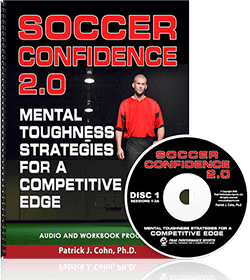
Do You Feel Stressed During Games?
Do you feel “stressed” during games?
Think of a game where you felt butterflies in your stomach (stress) just before the start…
Were you energized by those emotions leading to a good performance or did your emotions overwhelm you and hurt your performance?
Stress gets a “bad rap” in soccer. Many soccer players view stress as negative and something to be avoided at all costs but that is not at all the reality of sport performance.
What is stress?
Athletic stress is a reaction to a stressor (parents attending a game, your opponents, discomfort, the score, playing with a slight injury or the competition itself).
Athletic stress is an emotional and physiological response experienced when an athlete encounters a challenging situation.
It is your response to this challenge that triggers how you handle stress…
If you perceive the competitive demands as greater than your ability then your stress response is prolonged, intense and hurts performance.
This “negative stress” ruins your performance and enjoyment of soccer.
What are the signs and symptoms of stress?
Physiological stress symptoms include: muscle tightness, sweating, “goose bumps,” upset stomach, elevated heart rate, jitters and fatigue.
Emotional stress responses include: nervousness, feeling overwhelmed or frustrated, difficulty concentrating, poor decision making, and reduced confidence.
Being aware of how you react to stress in games can help you manage the stress response and use it to your advantage.
Can stress help soccer players perform?
A little bit of stress, also called positive stress can be invigorating and energizing.
Small amounts of stress are beneficial for peak performance. Positive stress can ready you for the demands of competition.
That’s correct… “Positive stress” is not only beneficial but needed for you to perform optimally. For example, it can heighten your intensity and help you focus your best.
Try these tips to benefit from “positive stress” in games:
Tip #1: You want to focus on “controlling the controllables.” You may not be able to control all stressors inherent in games but you can control your reaction to those circumstances.
Tip #2: Change how you view stress. Understand that your response to stress can lead to a great advantage over your competition. When you experience the symptoms of stress, tell yourself, “This is good, this is a normal response… I am ready to compete.”
Tip #3: If your stress hurts your performance in the opening moments of a game and does not go away quickly, it’s probably negative stress based on fear of failure. In this case, you’ll want to contact a mental game coach to help you manage this.
Successful soccer players have learned how to perform with ultimate confidence in competition. We’ve developed Soccer Confidence, a Workbook Program to help you do this.
Related Sports Psychology Articles
- Do You Perform Better in Practice Than in Games?
- Your Peak Performance for Playoffs
- 4 Ways To Improve Soccer Performance
- Subscribe to The Sports Psychology Podcast on iTunes
- Subscribe to The Sports Psychology Podcast on Spotify
Download a free sports psychology report to improve your mental game!
Learn more about our one-on-one mental game coaching.
Boost Confidence in Soccer

“Soccer Confidence 2.0” 3-CD and Workbook program is the most comprehensive mental game program we’ve offered to the public. We’re virtually giving away all our mental game secrets for the incredibly low price of only $197.00 including the free bonuses!
“Soccer Confidence” is a complete brain dump of the TOP NINE mental training sessions we teach our soccer players to help them boost their mental game and improve consistency – from how to mentally prepare for games to performing under pressure to building unstoppable confidence.
Leave a Reply